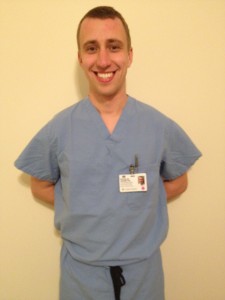The Lahey Clinical Research Preceptorship Program is a highlight of the Postbac Premed program. Each year six part-time, credited and paid research opportunities are available. Students apply and are selected and then spend 10 hours per week at Lahey Health (a teaching hospital of Tufts University School of Medicine.) Doug Johnston speaks about his experience working in Colon and Rectal Surgery:
Before beginning my preceptorship at the Lahey Clinic in Burlington, my only experience in medicine was in psychiatry. Needless to say, the transition from learning about adolescent psychiatric care to observing colorectal surgery was about as drastic a change as one could encounter in medicine. As it turns out, instead of being overwhelmingly intimidating, the entirely new environment of an operating room with foreign (to me) conditions being treated is exhilarating, and only further piques my fascination with medicine.
My time at Lahey is only half over, but already I have gained an appreciation for the multitude of factors taken into account in surgical practice. While I would hesitate to say any colorectal surgical intervention is typical, it has been amazing to see the variation between “simple” 30-minute procedures, and 5-6 hour procedures where major changes to the planned course of treatment have become necessary only after the surgeons have been able to open the patient and assess the viability of their plans. Individual differences in anatomy, altered anatomy resulting from previous procedures, and severity of disease have all become frequent determinants of the course of treatment. Seeing these factors affect how surgeons physically manage each case intraoperatively could not be more exciting.
The value of my time at Lahey is largely due to welcoming and instructive climate fostered by the staff. I have yet to encounter a surgeon, fellow, resident, or nurse who hasn’t been eager to point out things my untrained eyes might miss, or explain the logic behind what they’re doing.
As different as colorectal surgery and adolescent psychiatric care are, I’m pleasantly surprised when I’m reminded that the aspects of patient care that seemed so important to me before are equally as important in such a different specialty. Relaying information tactfully and informatively, both good and bad, to worried relatives after an operation is not so different from meeting with concerned parents of a teenager hospitalized for psychiatric care. Similarly, and perhaps more importantly, explaining treatment options empathetically to an elderly patient who is on his fifth round of surgery is not so different from meeting with a scared, and maybe confused teenager who is completely new to mental health care.
A realization of the universality of these relationships is an adjunct benefit to my time at Lahey that I didn’t necessarily expect, but now value just as much as my experience in the operating room. I couldn’t imagine a better extracurricular premedical experience than the one I’m having at Lahey.

Leave a Reply